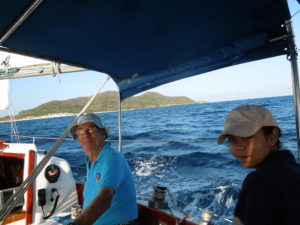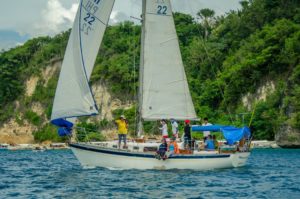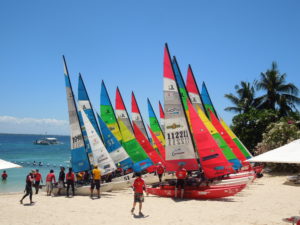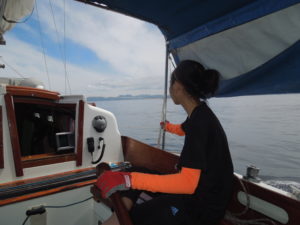Pull back, push forward. Though the sea is often seen as a serene and vast world, it is also a deep, ferocious force that devours beings whole. The sport of sailing, which has consumed my heart, is a balance between being swallowed by the leviathan and flying on its surface like a seagull. Poseidon likes you one moment then tries to drown you the next.
Sailing is truly a high-stakes, high-reward sport. Though a common 60-foot long sailboat is usually manned by a four- to eight-member crew, it demands each person’s strength, split-second reaction, absolute cooperation, perseverance, and skill. One person’s slow reaction time to release the jib—a sail that acts to tug the boat forward using the backwind—or inability to tuck to the other side of the boat to maintain the desired 45-degree angle can affect the sailboat’s overall performance.
With no sugar-coating, if you do not devote your entire existence to the joint effort of making your boat sail in those moments between the first horn of the starting line and the last horn of the finish line, it could even cost you your life. My Uncle David, who captains the sailboat, and my Aunt Angie, who got me into the sport, have often joked that if you tipped overboard, you were on your own to swim back ashore because the boat is not going to waste time turning back for you. It is a relief to say that I have not fallen into the water yet to test their bluff.

Following the race, a sailor’s reward is a humble one: a hearty meal, a cold brew to complement it, and a simple awarding of accolades to those conquerors of the sea. Some of the sailors—most of whom are people in their 60s or 70s—stick around after the ceremonials to belt out show tunes and refill their pilsner mugs. The others retire back to their boats for a well-deserved sleep.
In my four years of growing my own sea legs, I have joined two regattas, both of which were Puerto Galera Yacht Club’s annual All-Souls Day Regatta. In my first year, Team Freewheeler, where I belong, bagged 4th place in the overall award against 18 other sailboats. Not a bad beginning. In my next regatta, we returned hell-bent to claim a trophy to take home since none is given for 4th placers. Those three days of rain, shine, and hard work paid off when we returned to Manila with an overall 1st place trophy.


Aside from racing, Freewheeler explores the many beautiful islands in the Philippines. It anchors off from Manila for days or weeks at a time when the weather is kind, and I am on it on summer breaks.
For the past two decades, however, Freewheeler has been involved in another kind of sailing event. This event is the Philippine Hobie Challenge. For a span of seven days, sailors from different parts of the world embark on daily races around various islands that last from five to eight hours. The name lives up to reality, because in my opinion, Hobie sailing is even more dangerous and strenuous than sailboat racing. For one thing, Hobie Cats are a different kind of boat. It is a double-hull catamaran that stretches from 10 to 21 feet long, reaches 20 to 33 feet high, and is usually manned by two sailors at a time. So though they may be smaller and lighter—which contributes to the lightning speeds they are capable of going—they demand more physical labor to steer and keep the boat from capsizing because of heavy winds.



I have partaken in the past three Philippine Hobie Challenges, and this year the 18th Philippine Hobie Challenge was held around Coron, Palawan. I did not join as a competitor but as a member of the support fleet. The fleet comprises of big sailboats and is vital to the overall race. One of our roles is to report the wind knots and wave heights ahead to the racers through radio relay. Another is to take charge of the start and finish lines, rescue capsized Hobies, and tow them back to safety. The sailors truly feel safer to race with us around.
And why do sailors volunteer to join the support fleet? I can confidently say that it is for the experience that sailing gives. Each day at sea is once in a lifetime, and the sights and adventures hold no comparison to anything else I have ever done in my life. Being away from home, comfort, and especially cellphone signal may bring indisposition. However, the exchange you get out of it is invaluable: you get to meet people from all walks of life, have your own slice of life with nature all around you, and see outside of yourself by being exposed to how big and great the world really is, which is created by an even greater Creator.
A life of sea for me? I can get down to singing show tunes. #
Mariel Angela, or Jill, is a Grade 12 student taking the Humanities course under the 6-Year Program of UA&P. Aside from playing in the school’s volleyball varsity and volunteering in other school and non-school organizations and events, she enjoys reading and writing and connects them to people and things that exist within life in order to fully understand it.
Leave a Reply